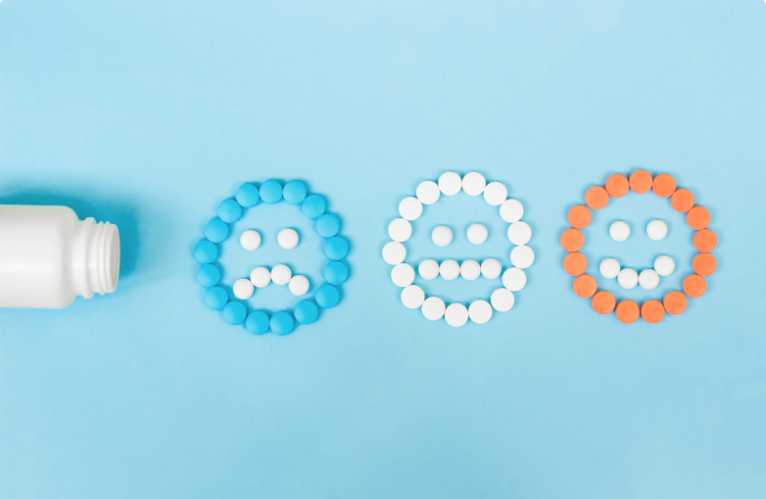
What is Lithium?
It is a mood-stabilizing medication used to treat a variety of mental disorders. It is used to treat mania, hypomania, schizophrenia, bipolar disorder, and certain varieties of depression.
Commonly prescribed medications and maintenance therapy for bipolar disorder manic episodes.
How does it work?
Sodium transport in nerve and muscle cells is modified by lithium. It alters the secretion of substances such as dopamine and serotonin. Additionally, it helps you to better regulate your emotions and manage your bipolar mood swings.
It is taken orally in tablet, capsule, or liquid form. The dosage of medication varies from individual to individual. It depends on the patient's age, general health, and other medications.
Lithium requires one to three weeks, or sometimes a month, to begin working. Some patients exhibit partial effects, while others do not respond to the medication.
If you're taking lithium:
- Take lithium with food
- Eat and drink normally
- Drink plenty of water to avoid dehydration
- Avoid drinking alcohol and illegal drugs
- Low sodium diets and dehydration can increase the risk of lithium toxicity
- Avoid medication that contains non-steroidal anti-inflammatory medication (NSAID)
- Avoid excessive intake of caffeinated beverages. They can decrease the level of lithium effectivity
- Remember to talk to your doctor if you missed or take too much lithium
Lithium exposure and Pregnancy
Pregnancy is not regarded as a treatment indication for lithium. If you have bipolar disorder and want to become pregnant, you must discuss the risks and benefits of your treatment with your doctor.
Lithium has been linked to an increased risk of Ebstein anomaly. It is a congenital heart defect associated with lithium exposure during pregnancy. If a patient continues to take lithium, an ultrasound of the heart is advised between 4 and 36 weeks of gestation.
Do not discontinue lithium without first consulting your healthcare provider. Discontinuing treatment during pregnancy will increase the risk of relapse significantly. Lithium is not recommended while breastfeeding. It will transfer to the breast milk that the neonate will consume.
What are the side effects?
Short term
· Improve or disappear after a few days
· stomach discomfort
· mild nausea or diarrhea
· vertigo or dizziness
· muscle weakness
· feeling dazed
Long term
· Shaking hands
· Feeling very tired
· Feeling very thirsty
· Frequently or increased amount of urination (pee)
· Stomach upset or weight changes
· Metallic taste in your mouth or increased saliva
· Acne or rash
· Headache
· Kidney Problem
· Hyperthyroidism
Before beginning lithium therapy, it is essential to obtain kidney and thyroid function tests. Lithium has been linked to weight increase. Before beginning treatment, it is crucial to assess the patient. Additionally, it is advantageous to determine whether the patient has prediabetes, diabetes, or dyslipidemia.
Monitoring should be performed every 1 to 2 weeks until the desired therapeutic levels are reached. It is also essential to monitor patients for dehydration and to reduce the dose if they exhibit symptoms of infection, excessive sweating, or diarrhea.
If side effects worsen, this could indicate lithium toxicity. Immediately contact your doctor if this occurs.
Lithium Toxicity
Normal monitoring of lithium levels is required. If it is too low, the medication has no effect, whereas if it is too high, you may experience more adverse effects.
Signs of lithium toxicity are:
- Increased stomach pain, vomiting or diarrhea
- Increased muscle weakness, shaking or twitching
- Severe drowsiness or dizziness
- Staggering or trouble walking or slurred speech
- Dry mouth, very thirsty
- Ringing in the ears
- Blurred vision
- Swelling of your face, mouth, or tongue that may cause difficulty in breathing and swallowing
Important reminder:

· Do not stop Lithium suddenly
· Bipolar disorder requires long treatment so do not stop even when you feel better
· Rapid discontinuation increases the risk of relapse
· Do not change your dose without talking with your healthcare provider
References:
www.healthdirect.gov.au/lithium
www.ncbi.nlm.nih.gov/books/NBK519062/
www.nami.org/About-Mental-Illness/Treatments/Mental-Health-Medications/Types-of-Medication/Lithium